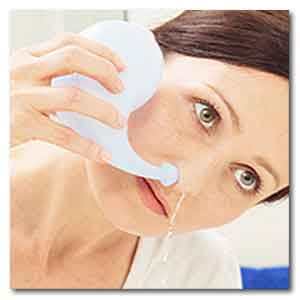|
Little teapots with long spouts have become a
fixture in many homes to flush out clogged nasal
passages and help people breathe easier.

Along with other nasal irrigation systems, these
devices — commonly called neti pots — use a saline,
or saltwater, solution to treat congested sinuses,
colds and allergies.
They’re also used to moisten nasal passages exposed
to dry indoor air. But be careful.
According to the U.S. Food and Drug Administration
(FDA), improper use of these neti pots and other
nasal rinsing devices can increase your risk of
infection.
These nasal rinse devices — which include bulb
syringes, squeeze bottles, and battery-operated
pulsed water devices — are usually safe and
effective products when used and cleaned properly,
says Eric A. Mann, MD, PhD, a doctor at FDA.
What does safe use mean? First, rinse only with
distilled, sterile or previously boiled water.
Tap water isn’t safe for use as a nasal rinse
because it’s not adequately filtered or treated.
Some tap water contains low levels of organisms —
such as bacteria and protozoa, including amoebas —
that may be safe to swallow because stomach acid
kills them.
But in your nose, these organisms can stay alive in
nasal passages and cause potentially serious
infections. They can even be fatal in some rare
cases, according to the Centers for Disease Control
and Prevention (CDC).
What Types of Water Are Safe to Use?
-
Distilled or sterile water, which you can buy in
stores. The label will state “distilled” or
“sterile.”
-
Boiled and cooled tap water — boiled for 3 to 5
minutes, then cooled until it is lukewarm.
Previously boiled water can be stored in a
clean, closed container for use within 24 hours.
-
Water passed through a filter designed to trap
potentially infectious organisms. CDC has
information on selecting these filters.
“There are various ways to deliver saline to the
nose. Nasal spray bottles deliver a fine mist and
might be useful for moisturizing dry nasal passages.
But irrigation devices are better at flushing the
nose and clearing out mucus, allergens and
bacteria,” Mann says.
Plain
water can irritate your nose. The saline allows the
water to pass through delicate nasal membranes with
little or no burning or irritation.
And
if your immune system isn’t working properly,
consult your health care provider before using any
nasal irrigation systems.
Whether for a child or adult, talk to your health
care provider to determine whether nasal rinsing
will be safe or effective for your condition.
If symptoms are not relieved or worsen after nasal
rinsing, then return to your health care provider,
especially if you have fever, nosebleeds or
headaches while using the nasal rinse.
For
more information
U.S. Food and Drug Administration
Is Rinsing Your Sinuses
With Neti Pots Safe?
Link...
MDN |